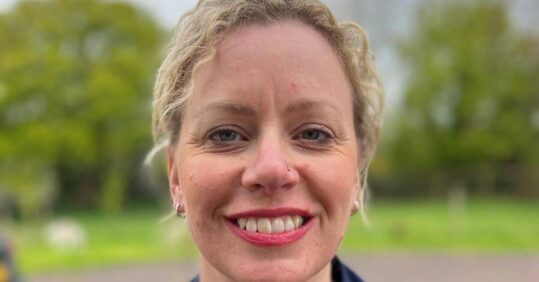Leadership programme supports practice nurse to feel ‘worthy and listened to’

A general practice nurse has told how a leadership programme has supported her to find her ‘voice’ and ‘open doors’ she did not think she could previously.
Frances Baverstock was working at Plas Menai Health Centre in North Wales when she was accepted onto the Florence Nightingale Foundation’s (FNF) leadership programme during the Covid pandemic in 2020.
Having recently moved to Wales from England, and after 20 years of general practice nursing, Ms Baverstock was looking for a fresh opportunity to enrich her career and meet new people.
She explained that GPNs can be made to feel like ‘they’re just a nurse,’ stressing the importance of not ‘lowering your status’ and being ‘brave’ and ‘bold’ in your work.
Related Article: New preceptorship package for social care nurses
‘I now know that I am worthy, I have got a voice, I can be listened to, and that’s given me so much more confidence,’ Ms Baverstock told Nursing in Practice.
For the first stage of the application, she was asked to pitch a quality improvement (QI) project, to be used by staff at her practice.
She suggested creating an online preceptorship app, which could be used to support recruitment and retention, while providing a virtual buddy and useful chat facilities for nurses.
‘I thought this was especially important for people who are new to general practice, because it can be quite a lonely and isolating profession,’ she said.
For the FNF interview process, applicants were divided into teams of eight and were watched for how they interacted with others, as well as how they presented themselves.
Following the group task, Ms Baverstock was accepted onto the scholarship, where she was awarded £5,000 from the FNF to spend on attending specific leadership training programmes. Of the money that was given, £1,000 had to be supplied by Ms Baverstock’s practice.
When she first joined the training calls, Ms Baverstock said she had not appreciated the ‘gravity’ of what she was about to do.
‘I realised, this is massive. There were head executives, nurse leaders, all these really big people, and I thought oh my gosh I’m just a practice nurse,’ she said.
Related Article: Applications to study nursing in England at ‘new low’
‘I don’t know if I had understood how big it was, whether I would have felt like I could even go for it.’
Training sessions included breath work, presentation skills development, grounding techniques and confidence mantras to uplift and encourage nurses, especially in challenging working environments.
‘It was just transformational for me as a leader. I think it was a real turning point,’ Ms Baverstock said.
After returning from the programme, Ms Baverstock sent her practice managers a letter with a job description that she wrote herself, outlining the job that she wanted and the skills she had.
Related Article: Paul Rees appointed as permanent NMC chief executive and registrar
She went on to become clinical governance lead for the practice.
‘I think people who do the scholarship have what’s called the “Florence effect”,’ said Ms Baverstock, adding that ‘most people get a promotion after they finish their scholarships’.
‘The scholarship ‘gives you those tools and opportunities to go ahead and maybe even open doors that you didn’t think you could open before’, she added.

See how our symptom tool can help you make better sense of patient presentations
Click here to search a symptom




